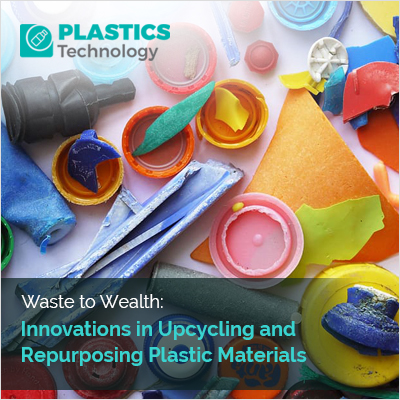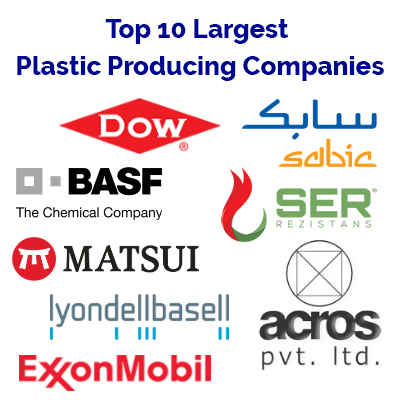Waste to Wealth: Innovations in Upcycling and Repurposing Plastic Materials

Introduction:
In response to the escalating environmental challenges posed by plastic waste, industries are progressively embracing inventive solutions for upcycling and repurposing plastic materials. This piece delves into the recent strides made in waste-to-wealth technologies within the plastics sector, illuminating sustainable practices that not only mitigate environmental issues but also open avenues for economic prosperity.
1. Circular Economy in Plastics: Redefining the Manufacturing Process
The idea of a circular economy has surfaced as a revolutionary method for reimagining the conventional linear manufacturing process, especially in the plastics industry. Diverging from the linear 'take-make-dispose' model, the circular economy strives to establish a closed-loop system, ensuring that resources, specifically plastics, undergo continuous reuse, recycling, and repurposing. In the realm of plastic manufacturing, this transition entails not only the creation of high-quality products but also a design approach that prioritizes recyclability and reusability.
Companies around the world are increasingly adopting closed-loop systems and recycling initiatives to align with this circular model. For instance, major players in the beverage and packaging industry have introduced bottle-to-bottle recycling programs, allowing used plastic bottles to be collected, processed, and remanufactured into new bottles. Such initiatives not only contribute to waste reduction but also showcase the economic viability of circular practices, paving the way for a more sustainable and environmentally conscious future in plastic manufacturing.
2. Advanced Recycling Technologies: Breaking Down Plastic Waste
In the quest to address the challenges posed by plastic waste, advanced recycling technologies have emerged as groundbreaking solutions, offering promise in handling a diverse range of plastic materials, including complex and contaminated waste. Among these cutting-edge technologies, chemical recycling, pyrolysis, and depolymerization stand out. Chemical recycling involves breaking down plastic polymers into their original building blocks, allowing for the creation of new, high-quality plastics. Pyrolysis, on the other hand, utilizes high temperatures in the absence of oxygen to convert plastic waste into valuable fuels, chemicals, or feedstocks. Depolymerization involves the selective disassembly of polymers into their constituent monomers, facilitating the regeneration of high-quality materials. What sets these technologies apart is their ability to tackle challenging plastic waste streams, such as multilayered packaging and contaminated plastics, which are traditionally difficult to recycle through mechanical means. By harnessing the potential of these advanced recycling technologies, the industry is not only diverting plastic waste from landfills but also opening avenues for the circular use of plastics, thereby contributing to a more sustainable and resource-efficient future.
3. Upcycling Innovations: Turning Plastic Waste into High-Value Products
In a noteworthy shift toward sustainability, various upcycling projects are at the forefront of repurposing discarded plastics into valuable materials and products, effectively mitigating the environmental impact of plastic waste. A prime example is the creative utilization of recycled plastics to produce stylish and durable clothing, diverting plastic bottles and packaging away from landfills.
Furthermore, initiatives are concentrating on transforming plastic waste into construction materials,
offering eco-friendly alternatives for infrastructure development. Beyond the environmental advantages, these upcycling initiatives present compelling economic prospects and market opportunities. The production of upcycled plastic products not only diminishes the need for virgin materials but also taps into a growing consumer market that increasingly values environmentally conscious alternatives. Companies involved in these endeavors stand to benefit not only from a positive brand image but also from the economic viability of providing distinctive, sustainable products in a market that prioritizes eco-friendly choices. Consequently, upcycling innovations create a mutually beneficial scenario, where environmental responsibility aligns with economic incentives, reshaping perceptions and practices within the plastic industry.
4. Repurposing Plastics in Construction: Sustainable Building Materials
In a noteworthy endeavor to diminish the environmental impact of the construction sector, there has been a notable upswing in repurposing plastics for the development of sustainable building materials. This inventive strategy not only tackles the challenges associated with plastic waste but also offers construction solutions that are both environmentally sound and economically viable.
Plastics, usually discarded and viewed as environmental pollutants, are now being converted into construction materials celebrated for their durability and resilience. These materials showcase attributes such as being lightweight, flexible in design, and resistant to corrosion, making them increasingly sought-after in construction projects. Furthermore, the repurposing of plastics into construction materials proves to be economically efficient, providing an alternative to traditional building materials while diverting plastic waste from landfills. Beyond economic considerations, these plastic-based construction materials are gaining recognition for their energy efficiency, as their production typically demands less energy compared to traditional materials like concrete or steel. As the construction industry persistently pursues sustainable practices, repurposing plastics into building materials represents a substantial leap toward a more environmentally conscious and robust approach to infrastructure development.
5. Collaborative Initiatives: Industry Partnerships for Sustainable Solutions
The quest for sustainable solutions in managing plastic waste has sparked cooperative initiatives among industries, research institutions, and governments, fostering innovation and instigating substantial change. Collaborative partnerships play a crucial role in consolidating resources, expertise, and diverse perspectives to tackle the intricate challenges associated with plastic waste. Numerous successful instances illustrate how combined efforts have resulted in the creation of cutting-edge upcycling and repurposing technologies. Notably, partnerships between major corporations and research institutions have led to groundbreaking advancements in converting plastic waste into high-value products, showcasing the potential of inter-sector collaboration. Additionally, partnerships between governments and industries have played a pivotal role in establishing supportive policy frameworks and incentives for sustainable practices. By cultivating an environment of knowledge-sharing and collaboration, these joint initiatives not only expedite the development of innovative solutions but also contribute to a more comprehensive and effective global approach to managing plastic waste.
6. Challenges and Opportunities: Overcoming Barriers to Adoption
The adoption of waste-to-wealth practices in businesses and industries encounters a spectrum of challenges that need addressing to fully realize the potential benefits of sustainable plastic waste management. A significant obstacle is the initial investment required for implementing advanced recycling technologies and upcycling initiatives. Businesses often grapple with financial barriers when embracing these practices, necessitating strategic planning and financial support for a smooth transition.
Additionally, the absence of standardized regulations and infrastructure for plastic waste management poses a hurdle, with businesses contending with inconsistent policies and systems. On a positive note, government policies and incentives emerge as crucial enablers in overcoming these challenges. Governments can play a pivotal role by instituting clear and supportive regulations, offering financial incentives for sustainable practices, and fostering collaborative frameworks. Policies that promote extended producer responsibility and incentivize the use of recycled materials in manufacturing significantly contribute to creating a conducive environment for waste-to-wealth adoption. By addressing these challenges and leveraging government support, businesses can unlock the considerable opportunities embedded in sustainable plastic waste management, fostering a transition towards a more circular and environmentally responsible economy.
7. Consumer Awareness and Education: Promoting Sustainable Choices
The success of upcycling and repurposing initiatives in managing plastic waste sustainably is heavily reliant on consumer awareness and education. Informing consumers about the environmental consequences of plastic consumption equips them to make informed choices and actively contribute to the establishment of a circular economy. Thoughtful purchasing decisions, such as selecting products with minimal packaging, choosing items made from recycled materials, and supporting brands dedicated to sustainability, empower consumers to reduce their plastic footprint. Additionally, educating consumers on proper plastic disposal and recycling enhances the impact of individual actions. By fostering a sense of responsibility and advocating for sustainable choices, consumer awareness becomes a driving force in creating a demand for eco-friendly products and practices. Ultimately, this encourages businesses not only to adopt but also to expand their commitment to waste reduction and circular practices.
Conclusion:
In summary, this article highlights the pivotal innovations in upcycling and repurposing plastic materials, underscoring their significance in forging a sustainable and economically sound future for the plastics industry. Delving into these inventive approaches enables businesses to play a dual role in environmental conservation and improving their financial standing.




